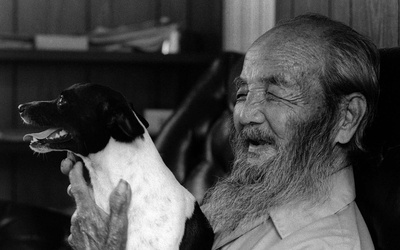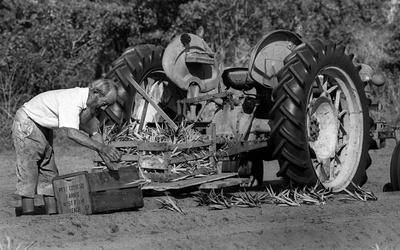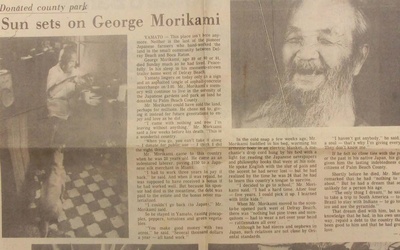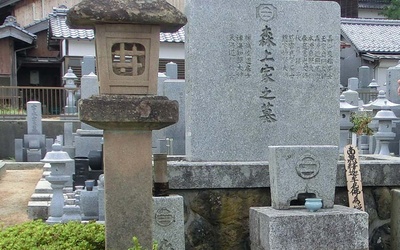A lonely longing for home - From the letters of Morikami Suketsugu, a Japanese immigrant in Florida

In the early 20th century, the Japanese village of Yamato Colony appeared in southern Florida. Morikami Sukeji (George Morikami), who immigrated from Miyazu, Kyoto City as a farmer and pioneer, is the man who laid the foundation for the Morikami Museum and Japanese Gardens, which is now located in Florida. He stayed on after the colony was dissolved and disappeared before the war, and continued farming alone through the war. He ended up donating a huge amount of land, leaving his name in the local area. He remained single throughout his life and never returned to Japan, but he was more homesick than most and continued to write letters to Japan. He corresponded frequently with the Okamoto family, including the wife and daughters of his late brother. Although he never met them, he treated them like family and sent them information about the situation and his thoughts in the area. The letters he left behind trace his life and lonely homesickness as a record of one generation.
Stories from this series

Episode 36: I'm the last survivor
July 10, 2020 • Ryusuke Kawai
Morikami Sukeji, who came to the United States as a member of the Yamato Colony in South Florida and stayed there alone until the end of his life after the colony was disbanded, continued to write letters to his sister-in-law and her family, who had lost her husband (Sukeji's younger brother) after the war. In November 1973, at the age of 87, he complained of a lot of pain in his body and other ailments. He could barely walk a …

No. 35: Donating land to become a park in the future
June 26, 2020 • Ryusuke Kawai
Morikami Sukeji, who traveled to the United States as a member of the Yamato Colony in South Florida and stayed there alone until the end of his life after the colony was disbanded, continued to write letters to his sister-in-law and her family, who had lost her husband (Sukeji's younger brother) after the war. He was satisfied that various birds were gathering in the forest he owned. He was enthusiastic about planting trees in America, and planted 5,000 cypress seedlings, …

#34 Rapid development, want to move to the countryside
June 12, 2020 • Ryusuke Kawai
Morikami Sukeji, who came to America as a member of the Yamato Colony in South Florida and stayed there alone until the end of his life after the colony was disbanded, continues to write letters to his sister-in-law and her family, who lost her husband (Sukeji's younger brother) after the war. His recollections go back further and further in time, as he recalls and relays stories told to him by his grandfather, who was a courier for the Miyazu Domain …

No. 33 Decide on your own grave
May 22, 2020 • Ryusuke Kawai
Morikami Sukeji traveled to the United States as a member of the Yamato Colony in South Florida, and remained there alone until the end of his life after the colony was disbanded. After the war, Sukeji continued to write letters to his sister-in-law and her family, whose husband (Sukeji's younger brother) had died. Although Sukeji increasingly complained of physical ailments and pain, he continued to work in the fields intermittently, ordering seeds from Japan and so on. At one point, …

No. 32: I never returned to Japan
May 8, 2020 • Ryusuke Kawai
Morikami Sukeji, who traveled to the United States as a member of the Yamato Colony in South Florida and stayed there alone until the end of his life after the colony was dissolved, continues to write letters to his sister-in-law and her family, who lost her husband (Sukeji's younger brother) after the war. He worries about her life as she works for Tenrikyo in Kyoto. He boasts about the wonderfulness of Florida grapefruit, which is sweet, sour, and bitter. He …

Episode 31: Japan lost the war, but...
April 24, 2020 • Ryusuke Kawai
Morikami Sukeji, who came to America as a member of the Yamato Colony in South Florida and stayed there alone until the end of his life after the colony was disbanded, continued to write letters to his sister-in-law and her family, who had lost her husband (Sukeji's younger brother) after the war. In January 1972, he learned of Yokoi Shoichi, a former Japanese soldier found on Guam, and he felt a connection with him. He learned about American hippie culture …


